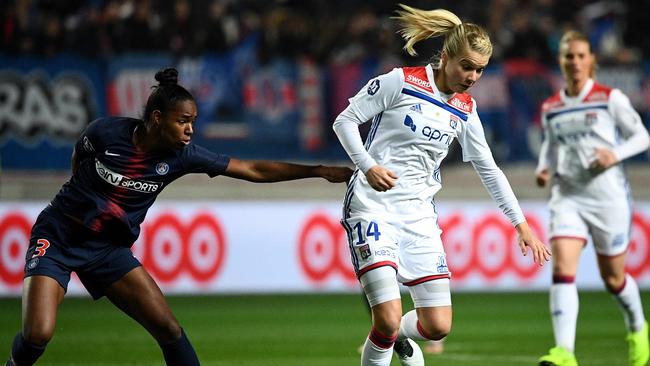How men’s deep-rooted bias is holding back women’s football
Why is women’s football judged in such a shrill way? Could it be they are playing what society still regards as a “man’s game’’?

Ada Hegerberg started playing football at the age of seven in her home country of Norway. Like many girls mad about the game, she initially competed with boys, enduring the odd comment, braving the rough and tumble, but growing rapidly in skill and resilience.
By 15, she had joined the women’s top division in Norway. After a spell in Germany she moved to France in 2014, leading Lyons to the treble for two straight seasons and smashing multiple records. Last season, she had another remarkable campaign with 53 goals in all competitions, including a record 15 in the Champions League. “A phenomenon,” one pundit said.
Perhaps her most impressive quality, however, is psychological, with coaches eulogising her work ethic and attention to detail. “She has a winning mentality,” Hege Riise, winner of the Golden Ball at the 1995 World Cup, said. Another said: “Few players demonstrate such professionalism.”
On Monday evening, Hegerberg, 23, won the inaugural Ballon d’Or for female players. It was a moment of vindication, sharing the stage with players such as Luka Modric, who won the male award. The host, Martin Solveig, a French DJ, didn’t ask her about football, however. And he didn’t talk about her dedication or work ethic.

Instead, he asked: “Can you twerk?” For those unfamiliar with the term, this is a dance move, originating in New Orleans, where people “move in a sexually provocative manner, throwing or thrusting their hips back or shaking their buttocks”.
Now, some have said that Solveig simply made a poor joke — he apologised to Hegerberg after the ceremony and she took it in good grace. They also pointed out that the DJ danced on stage with Kylian Mbappe, the French player. Others responded, not unreasonably, that no male player would have been asked about a highly sexualised dance while receiving such an accolade. Either way, what seems clear is that the reaction to the incident was about more than Solveig or, indeed, Hegerberg.
It is difficult to overlook, for example, how any article which touches on women’s football on these pages receives a curiously agitated response. Decent, normally courteous men write in large numbers to complain about the coverage afforded to women’s matches, about how it is “forced down their throats”, and about how it is akin to watching pub football.
Now, I have no doubt that they are expressing sincere opinions but it is the virulent tone of at least some posters that makes me wonder. Could it be that they are harbouring biases — doubtless subconscious — against women footballers? Could they be troubled by the encroachment of women on a stereotypically male preserve?
One may mention, here, the work of the psychologist Frank Flynn. He set up an experiment using Heidi Roizen, a successful tech entrepreneur, as a case study. Half the students were given a report about Roizen’s networking skills. The other half, the control group, were given precisely the same report, except for one detail. Heidi’s name was altered to Howard.
What happened? Those who read about Heidi found her less likeable and would have been significantly less likely to hire her. They thought they were being objective. They thought they were being fair-minded. But we can see that they were, in fact, judging her more harshly because she was a woman; because she was implicitly challenging the stereotype that entrepreneurs are — and should be — male. Little wonder that female entrepreneurs receive only a tiny fraction of venture capital funding.
It is in this context, I think, that one should ponder the challenges facing women’s football. I don’t think anybody would argue that they play near the level of top men but this could be said of tennis too, where the women’s final at the recent US Open nevertheless received more viewers than its male counterpart. Entertainment is not merely about individual skill but competition, history and narrative.

So why is women’s football judged in such a shrill way? Could it be because they are playing what society still regards as a “man’s game"? Could it be that by tearing around a pitch, and tackling hard, they subvert certain notions of femininity?
The barriers faced by female players are more subtle than one might suppose. Like any male player, Hegerberg looks to data to help her improve her game. And yet sports science has a bias towards studying men rather than women, which means that players such as Hegerberg have less empirical evidence upon which to base their training. According to one survey of science journals, 27 per cent of studies are focused exclusively on men, but only 4 per cent on women.
Or take the history of the women’s game, which has been studied in detail. Between 1917 and 1921, it was one of the fastest-growing sports in the UK, and players such as Lily Parr were instantly recognisable. In December 1920, a match at Goodison Park, which emerged from the hundreds of munitions teams that were formed during World War I, broke attendance records, with 53,000 in the ground and 14,000 locked out.
This all changed on December 5, 1921, when the FA banned women from playing at affiliated grounds. The governing body decreed that the game was “quite unsuitable for females”, a presumption that, over the ensuing decades, became entrenched in institutional decrees, exclusionary policies and, perhaps most importantly, hearts and minds. In 1952, June Gregson, a top player, came home to find that her boots had been burnt by her father.
Is it any wonder that women’s football is having to grow from such a low base of sponsorship and viewership given the decades of disadvantage, not to mention the stereotypes that pioneers such as Hegerberg are attempting to overcome? How could it have been otherwise?
One notes that media outlets today, including commercial ones, are taking a calculated gamble on the game, believing it has the potential to grow, just as women’s tennis did in the 1960s and 70s. With a football-mad six-year-old daughter, I hope they are right.
What is certain is that the response to the twerk incident was about more than a misplaced joke. The deeper contention is that biases and stereotypes can create dynamics that harden into barriers, as was the case in the entrepreneurs in the Flynn study, not to mention dozens of others. As for Hegerberg, perhaps we can all agree that she is a hell of a player and a fine spokesperson.
“I would like to end this speech with some words to young girls all over the world,” she said on Monday night. “Please believe in yourself.”
THE TIMES




To join the conversation, please log in. Don't have an account? Register
Join the conversation, you are commenting as Logout